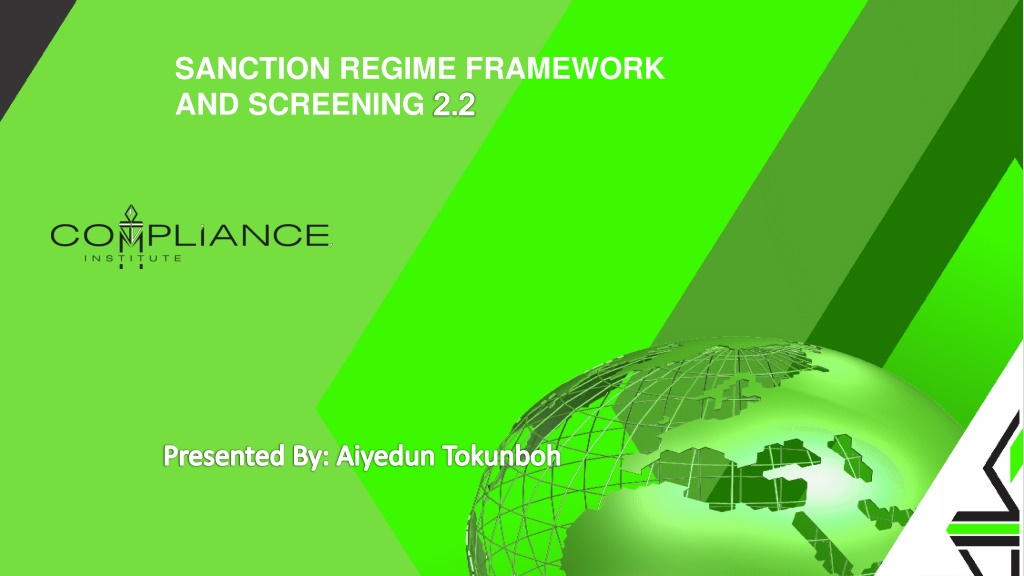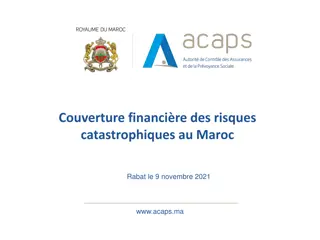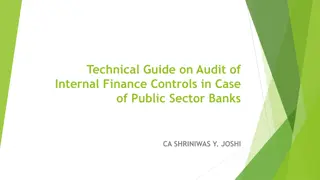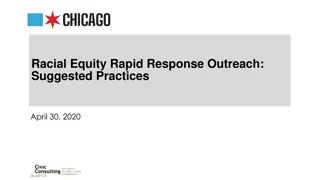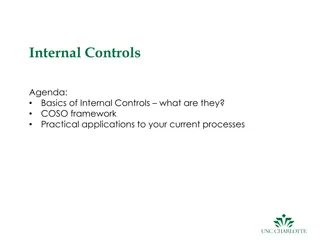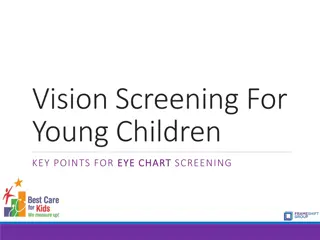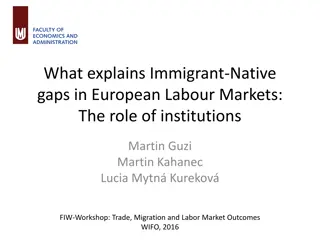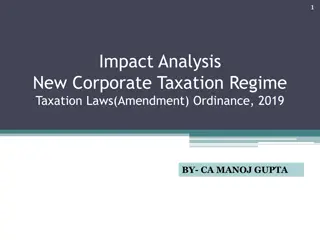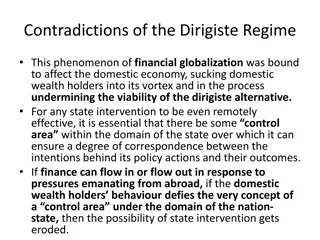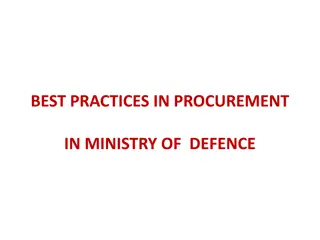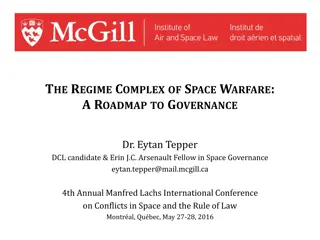Understanding Sanction Regime Framework and Screening Controls
The presented content illustrates the sanction regime framework and screening controls, highlighting the significance of sanctions, who should be screened, and what should be included in the screening process. It covers the scope of sanctions, the importance of sanction screening, tools used for screening, and the reasons behind conducting sanction screening to comply with regulatory requirements and prevent financial risks.
Download Presentation

Please find below an Image/Link to download the presentation.
The content on the website is provided AS IS for your information and personal use only. It may not be sold, licensed, or shared on other websites without obtaining consent from the author. Download presentation by click this link. If you encounter any issues during the download, it is possible that the publisher has removed the file from their server.
E N D
Presentation Transcript
SANCTION REGIME FRAMEWORK AND SCREENING 2.2 Presented By: Aiyedun Tokunboh
Sanction Systems & Controls Who Should be Screened What Should be screened Watch Lists Calibration Understanding Sanctions Measurement Programme
Sanctions Systems & Controls Sanctions are statutory or regulatory measures against designated or targeted individuals, entities, transactions or jurisdictions meant to achieve certain objectives. The objective is to prevent, protect or punish a line of action pertaining to an offending behaviour, criminal conduct or global instability. The sanction regime is an integral part of the implementation of the Anti-Money Laundering / Combating the Financing of Terrorism(AML/CFT) and the proliferation of Weapons of Mass Destruction (WMD) worldwide. The sanction regime associated with AML/CFT compliance is mainly financial.
Sanctions Systems & Controls (contd) SANCTIONS SCOPE (WHO/WHAT SHOULD BE SCREENED) A Transactions/Assets s Individuals/Entities Jurisdiction Goods and Services Freeze Order Blockages Prohibition Blockages Confiscation Freeze Orders Seizures Embargo s Forfeiture Seizures Travel Ban
Sanctions Systems & Controls (contd) SANCTION SCREENING Sanction screening is the process of reviewing customers and transactions against the sanction lists to confirm that: The customer has not been backlisted/ watch listed That transactions are not for the purpose of financing terrorism or financing crime. In conducting the review, different organizations make use of different tools such as: Swift Sanction Screening this is being used to review transactions to identify elements of money laundering and terrorist financing Side Safe watch This is being used to review customers to ensure that sanctioned individuals are not on-boarded by the financial institutions . NICE Actimize This is being used to screen both the customers and their transactions against the sanctioned list.
Sanctions Systems & Controls (contd) WHY DO WE CONDUCT SANCTION SCREENING. It is a regulatory requirement It helps the banks to take preventive measures to ensure that sanctioned individuals are not on-boarded and transactions are not processed via sanctioned vessels It helps the bank to comply with the reporting requirement mandated by the regulators It protects the bank from reputational damage and loss of license
Watch Lists Watch lists refers to a compendium of individuals, vessels, country e.t.c. that have been confirmed to engage in terrorist financing and can be internal or external in nature Internal watchlist refers to the list which the bank maintains by itself based on activities that are not in line with the policies and regulations of the country External watchlist refers to the lists which been put together in various jurisdictions and made available to all financial institutions to facilitate sanction screening e.g. United Nations Security Council ( UNSC ); United States Office of Foreign Assets Control ( OFAC ); Her Majesty s Treasury, United Kingdom ( HMT ); European Union ( EU ) and French Ministry of Economy, Finance and Industry (MINEFI) .
Calibration Sanction screening tools are calibrated to identify names of customers who may have been sanctioned to enable the financial institution investigate and confirm whether the customer is the sanctioned individual/entity or not. In calibrating the sanction screening tools, fuzzy logics are built in to help in the confirmation of whether the alerts generated are true positive or false positive. Fuzzy logics is therefore used to handle the concept of partial truth where the truth value may range between completely true and completely false. A false positive error gives the indication that a given condition exists, when it does not.
Quality assurance and testing Sanctions quality assurance enables a Bank to have continuous comfort that their filters are effective. Sanction testing provides the Bank with the insight and understanding that is key to maintaining a strong sanctions compliance programme. It is important that the testing exercise is conducted independent of the Compliance function and on a frequent basis to enable the Bank identify gaps which may require fine tuning of the logic built into its systems.
Understanding Sanctions A sanction - is a measure adopted against a country, regime or individual believed to be violating international law. Sanctions are political trade restrictions put in place with the aim of maintaining or restoring international peace and security. Sanctions restrictive/coercive measures, and may involve: The freezing of funds. The withdrawal of financial services. Bans or restrictions on trade. Bans or restrictions on travel. Suspension from international organisations. tend to take the form of
Understanding Sanctions (contd) What are sanctions designed to achieve? To coerce a regime or individuals within a regime into changing their behaviour or aspects of it (offending behaviour) by increasing the cost on them to such an extent that they decide to cease the offending behaviour. To constrain a target by trying to deny them access to key resources needed to continue their offending behaviour, including money laundering, financing of terrorism or nuclear proliferation. To signal disapproval of a target as a way of stigmatising and potentially isolating them or as a way of sending broader political messages to international or domestic constituencies. To protect the value of assets that have been misappropriated from a country, until such a point that they could be repatriated. In the fight against Money Laundering and Terrorism Financing, the application of sanction is important, as it serves as a deterrence to perpetrators.
Measurement FINANCIAL SANCTION Financial sanctions are restrictions put in place by governments or multilateral organizations to limit the provision of certain financial services or restrict access to financial markets, funds and economic resources in order to achieve a specific foreign policy or national security objective. Examples of Financial Sanctions are: Targeted Asset Freezes Restrictions on a wide variety of financial markets and services. Directives to cease all business of a specified type with a specific person, group, sector or country. NON FINANCIAL SANCTION Non financial sanctions refer to sanctions which do not have financial implications e.g. travel ban.
PROGRAMME Selective sanction this type of sanction targets specific individuals and entities and does not prohibit trade with the country as a whole. Certain institutions, based on their internal compliance policies, may nonetheless refuse to process payments to such jurisdictions regardless of the selective sanctions. Comprehensive sanction this targets the country as a whole, and prohibit trade with such country. An example is the US refusing to deal with Cuba in any capacity. Regime based sanctions this is targeted at a particular government and is used to persuade the government to change their policy by restricting trade, investment or other commercial activity
Practice Question 1 Office of Foreign Asset Control (OFAC) , is a creation of the US Treasury Department. Which of the following is an objective of OFAC: A. To administer and enforces economic and trade sanctions based on US Foreign policy and national security goals against targeted countries and regions, terrorists, drugs traffickers To target and sanction entities and individuals considered threats to the national security, foreign policy or economy of the US. To impose controls on transactions and freeze assets under US jurisdiction All of the above B. C. D.
Practice Question 2 Uniting and Strengthening America by Providing Appropriate Tools Required to Intercept and Obstruct Terrorism (USA PATRIOT ACT) was a US Government law that was established in what year? A. 1986 B. 1970 C. 2001 D. 2013
Practice Question 3 What are SDNs? A. They are individuals, groups or companies listed in the sanction list by OFAC for being involved in terrorism or product/trafficking of Narcotics B. They are citizens of the countries identified as non-cooperative C. All of the above D. None of the above
Practice Question 4 What is Sanctions Screening? A. It is the process of reviewing the sanction list to look for terrorists B. It is the process of filtering our transactions and customers against various sanctions lists C. A and B above D. None of the above
END OF MODULE 2.2 Presented By: AIYEDUN TOKUNBOH Email: tokunboh.aiyedun@suntrustng.com Phone: 2348033580585
Industry Knowledge and Awareness Module 2.3 2:00 2:30pm Presented By: Aiyedun Tokunboh
Course Content Regulatory Principles Overview of Nigeria s Financial Sector, viz: Regulators (CBN, NDIC, SEC, NAICOM, PENCOM, FMF - NDIC/AMCON, etc) Operators (DMBs, FCs, PMBs, BDCs, MFBs, DHs, FHs, INS Coys, Pension Fund Organizations, Stock Broking Orgs, etc;) Markets (formal and informal) Instruments (Short, Medium & Long Term) Financial Products and Services. Supervisory Principles Self-Regulatory Organisations (SROs). Risks & The Need to Manage Them Codes of Corporate Governance Overview of Commercial Law & Mechanism Types of Legal Entities
REGULATORS IN THE FINANCIAL SECTOR (1) In the Nigerian banking and finance industry, there are different types of organizations. Essentially, the organizations can be classified into three, viz: 1. Regulatory organizations (Regulators) like the CBN, NDIC, SEC, etc. 2. Operating organizations (Operators) e.g. banks, insurance companies, stock broking organizations, pension fund organizations, etc. 3. Consumer organizations. These are users of services and products provided by operators in the industry. Some consumer-organizations include public and private companies, registered clubs and other associations, partnerships, etc. a) Regulatory Organisations: The first regulatory organization in the Nigerian banking and finance industry is the Central Bank of Nigeria. It was established by the CBN Act of 1958 and commenced business in 1959. It has the power to regulate and supervise banks in the country. One of its major instruments of regulations is licensing of banks. It also issues guidelines, circulars, codes and other directives to banks to fulfil its mandate.
REGULATORS IN THE FINANCIAL SECTOR (2) b) Operators: Formal orthodox banking was started in the country by Elder Dempster in 1894. That operating bank is what, over the years has metamorphosed to this day s First Bank of Nigeria Limited. Since the advent of First Bank, many other banks-foreign and indigenous-had operated or are operating in Nigeria. c) Customers: Customers of banking and finance organizations can simply be classified into three viz: individuals, registered organizations such as enterprises/partnerships and incorporated organizations like Limited Liability companies. Banking services since the Elder Dempster days have been patronized by business and non-business organizations. Thus, in terms of background, consumer- organizations of banking products and services have been with us for several years. It is however, important to appreciate that the organizations have become very diverse.
REGULATORS IN THE FINANCIAL SECTOR The regulators and Law Enforcement Agencies (LEAs) in the Nigerian Banking and Finance industry are: Central Bank of Nigeria (CBN) Nigeria Deposit Insurance Corporation (NDIC) National Insurance Commission (NAICOM) National Pensions Commission (PENCOM) Corporate Affairs Commission (CAC) Financial Reporting Council (FRC) Securities and Exchange Commission (SEC) Nigerian Stock Exchange (NSE) Federal Ministry of Finance Consumer Protection Council Economic and Financial Crimes Commission Nigeria Drug Law enforcement Agency Nigeria Police Special Fraud Unit Independent Corrupt Practices and Other Offences Commission Nigeria Financial Intelligence Unit Asset Management Company Of Nigeria Fiscal Responsibility Commission Credit Bureaus In Nigeria Revenue Mobilisation Commission Self Regulating Financial Bodies In Nigeria Association Of Chief Compliance Officers Of Banks In Nigeria (ACCOBIN) Nigerian Insurers Association (NIA) Association Of Bureaux De Change Operators Of Nigeria (ABCON) The Association Of Stockbroking Houses Of Nigeria (ASHON) Apart from regulating various aspects of the Nigerian banking and finance industry, the institutions also provide supervisory and oversight functions on the institutions and other players in the various segments of the industry.
FINANCIAL PRODUCTS AND SERVICES (1) Organizations in the Nigerian banking and finance industry provide various types of products and services in order to satisfy the needs of their customers. For players in the same segment or sub-sector of the industry, their services are basically homogeneous although differently branded. In the Banking Sub-Sector of the industry, the products and services provided include: Deposit services e.g. current account, saving account, term/fixed deposit account. Funds Transfer services e.g. Electronic Funds Transfer, (e.g. Mobil banking, Cheque Transfer, Telex Transfer, Internet banking, Point of sale, etc.) Credit /Loan Facility Services e.g. Personal/Consumer credits; Equipment loan, etc. Safe-Custody Services.
FINANCIAL PRODUCTS AND SERVICES (2) In the Capital Market Sub- Sector, the Services and products include: Buying and selling of stocks and shares (Stock broking). Raising of long-term funds Registrar Services. Investment advisory Services. Custodian and Trusteeship Services. Clearing and Settlement Services. Treasury Bills/ Certificates. In the Insurance Sub-Sector, the Services and products include: Life Assurance (individual and/or Group). Property Insurance (e.g. house, vehicle, etc) Others include: education insurance, accident insurance.
FINANCIAL PRODUCTS AND SERVICES (3) Pension Fund Sub-sector the Services include: Custodianship Services Pension administration Services (including payment of pensions to retirees) Deposit Insurance Services: Insurance of depositors money in the banks. Payment of insured deposits customers of a failed bank under liquidation. Protection of depositors interest. Mortgage banking products & services: Building/ construction loan. House renovation/restructuring loan Saving deposit services Land purchase loan services. Estate Development loan services. Corporate Affairs Commission Services: Company registration/incorporation Services.
CODES OF CORPORATE GOVERNANCE (1) DEFINITION OF CORPORATE GOVERNANCE According to CBN in its 2014 Code of Corporate Governance for Banks and Discount Houses, Corporate Governance refers to the rules, processes or laws by which institutions are operated, regulated and governed . In its 2006 edition of the Code of Corporate Governance for Banks and Other Financial Institutions, the CBN defines Corporate Governance as a system by which corporations are governed and controlled with a view to increasing shareholder value and meeting the expectations of the other stakeholders . Corporate Governance has also been defined as a set of mechanisms through which outside investors are protected from expropriation by insiders (including management, family interest and/or govt.). THE ESSENCE OF CODE OF CORPORATE GOVERNANCE: Among others, the essence of corporate governance is: To define/state standards To prevent abuses/ abusive management To ensure equitable distribution of power, authority and responsibility. To protect the interest of all stakeholders and to minimize asymmetric information between managers of businesses and their owners as well as customers. Lateef Odekunle (2016)
CODES OF CORPORATE GOVERNANCE (2) Aside from the Banking Industry and Capital market Sector Codes respectively issued by CBN and SEC, there are also these others: Code of Corporate Governance for Licensed Pensions Operators (2008) issued by PENCON. Code of Corporate Governance for the Insurance Industry in Nigeria (2009) issued by NAICOM. The National Code of Corporate Governance Nigeria (2016) issued by Financial Reporting Council of Nigeria. (FRCN). There are sectorial codes in the financial services industry. There is also a National Code which came into effect on October 17, 2016. All the sectorial Codes focus on issues that are both unique to their Sectors and others that are universal in nature. The National Code supersedes all other codes on Corporate Governance in the country such that where there is a conflict between the two, the National Code takes precedence and prevails. The National Code is articulated and presented in three (3) parts, viz: CODE OF CORPORATE GOVERNANCE FOR THE PRIVATE SECTOR. CODE OF CORPORATE GOVERNANCE FOR NOT-FOR- PROFIT ENTITIES; and CODE OF CORPORATE GOVERNANCE FOR THE PUBLIC SECTOR.
Overview Commercial Laws And Mechanisms Governing Legal Persons And Arrangement. What is commercial Law? Commercial law or business law is the body of law which governs business and commerce and is often considered to be a branch of civil law and deals both with issues of private law and public law. Commercial law regulates corporate contracts, hiring practices, and the manufacture and sales of consumer Legal rules that (1) determine the rights and duties of parties engaged in trade and commerce, (2) govern disputes arising out of ordinary transactions of buyers and sellers, and (3) settle issues concerned with banking, insurance etc.
Overview Commercial Laws And Mechanisms Governing Legal Persons And Arrangement. Commercial Law: An Overview Commercial law governs the broad areas of business, commerce, and consumer transactions. Specific laws have been developed in a number of commercial fields. These include: Banking Bankruptcy Consumer credit Contracts Debtor and creditor Landlord-tenant Mortgages Negotiable instruments Real estate transactions Sales Secured transactions
Overview Commercial Laws And Mechanisms Governing Legal Persons And Arrangement/2 Legal Entities and Legal Arrangements The Global Forum on Asset Recovery (GFAR) Guide to Beneficial Ownership Information: Legal Entities and Legal Arrangements provides a country-specific guide for Nigeria in collaboration with the Nigeria Extractive Industries Transparency Initiative ( (NEITI) to assist investigators on the type of information that is available on the natural persons who control legal persons and arrangements, such as companies and trusts, or otherwise play an important role in a legal person and arrangement in Nigeria, and the conditions that need to be met to be able to access such information.
Types of Legal Entities There are many types of legal entities that can be formed in Nigeria. Four major ones are: Limited Liability Company Incorporated Trustees Company Limited By Guarantee Registered Business Names
Register update Companies are required to keep the information reported to the Corporate Affairs Commission up-to date and the Corporate Affairs Commission has enforcement and sanction powers to ensure that information recorded in the registry is correct and up-to-date. The time frames for updates and penalties vary with the type of information, and the penalties for failing to comply are mostly fines. Companies limited by shares or guarantees are required to deliver an annual return to the Commission The trustees of a corporation are also required to submit to the Commission an annual return). If defective financial statements that do not comply with the CAMA are delivered to the Commission or to shareholders, every person who is a director of the company at the time is guilty of an offence and in respect of each offence, liable to a fine
How to Access Information In general, the following information is not publicly available online, but is available upon specific request and payment of the necessary fees: 1. Current Status (active, etc.) 2. Principal Purpose of Business 3. Registered Capital 4. Registered Agent Information 5. Officer/ Director Information (incl. power of representation) 6. Shareholder/ Member Information 7. Memorandum 8. Articles of Incorporation 9. Application/ Certificate of Formation 10. Annual/ Biennial Reports 11. Shareholder Register 12. Register of Charges 13. Historical Documents (example: past annual filings) Registry: The registry in Nigeria is called Corporate Affairs Commission. The Company Register is available online at www.cac.gov.ng Company Search: http://publicsearch.cac.gov.ng/comsearch/ Contact information for the registry is provided here: Phone: +234-8182298971; +234-8095521924 Email: cservice@cac.gov.ng In general, the following information is publicly available online (free or for a nominal fee, with no log-in requirements): 1. Name of Legal Entity 2. Entity Number (if any) 3. Type of Legal Entity 4. Date of Incorporation 5. Principal Address of Business
How to Access Information/2 In general, the following information is not available online or through another form of public access, but may be available to law enforcement, through specific procedures listed in further details below: Bank Account Information Payment Records Investigators can access this information by a simple request directed to the Registrar General. The information is provided speedily and at no cost. A special unit called the Status Desk is located at the office of the Registrar General for this purpose and attends primarily to investigators and Embassies. This practice is however not in existence today. Instead, investigators obtain court orders where necessary to obtain these information from financial institutions directly without payment of fees. Other Channels Foreign authorities may obtain information on legal entities, legal arrangements, or relevant persons from different sources in Nigeria. Such as Legal Individuals Legal arrangements Financial Institutions Other Designated Non financial Businesses and professions
Practice Question 1 The NFIU is a product of: A. EFCC Act B. FATF C. World Bank D. FATF and United Nations Convention Against Corruption
Practice Question 2 The goal of CPC s interaction with professional and industry associations is to: A. Provide advisory services with respect to industry standards. B. Develop, enforce quality standards and safeguard consumer interests. C. Leverage them to enforce quality standards as determined by such groups. D. All of the option
Practice Question 3 The registration and monitoring of products in the market place is the responsibility of: A. Standards Organization of Nigeria B. Self-regulating bodies C. Consumer Protection Council D. Standards Organization of Nigeria and Consumer Protection Council
Practice Question 4 Which of the following is exempted from filing annual returns? A. Small companies with share capital of less than N1million B. Incorporated trustees C. Unlimited companies D. Small companies with share capital of less than N1million and Unlimited companies.
Practice Question 5 Which of the following is not required in preparing the Memorandum of Association of a company? A. Objects B. Name C. Share Capital D. Directors
END OF MODULE 2.3 Presented By: AIYEDUN TOKUNBOH Email: tokunboh.aiyedun@suntrustng.com Phone: 2348033580585
